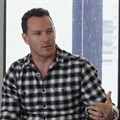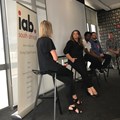#IABInsightSeries: Trends transforming the digital economy (JHB)
The Johannesburg session was held at MultiChoice City on Friday, 28 February and was sponsored by Incubeta, in partnership with Kantar, DSTV Media Sales, GetSmarter, a 2U, Inc. brand and Bizcommunity.
The panel comprised: Masego Sibiya, strategist at Sum of 21; Emma Carpenter, Fjord: group design director; Zubeida Goolam, co-founder and creative partner at Brandtruth/DGTL; Monique Claassen, client service director: Media & Digital at Kantar; and Roan Mackintosh, MD at incuBeta.
Here, Carpenter, Goolam and Sibiya delve into some of these trends and tell us what to watch out for in 2020...
The digital economy is changing at such a rapid rate. What are some of the trends transforming the digital economy at the moment?
Goolam:
In 2020, consumers need to familiarise themselves with a world that is always watching. Between the intricacies of data sharing and the rise of facial and voice recognition, the lines between private and public are starting to blur.Going forward, consumers will need to consider their potential privacy threats against the benefits these technologies and advancements will have.
Carpenter: One of our key trends at Fjord this year is the evidence of design transitioning from ‘me’ to ‘we’. User-centred design specifically for digital is feeling more and more selfish as it has often separated humans from the ecosystems they live and work within. Mindsets are shifting from catering for the individual to the collective and the digital economy is only going to benefit from the impact of innovation for a broader interconnected audience.
Why do you believe being aware of and embracing these trends is important for business?
Carpenter: Globally and locally customers and employees are questioning how business does business. Is driving profit the only way for companies to deliver growth or value? Is endless consumption the only way for humans to demonstrate their growth or value?
Goolam: Trends are driven by actual human behaviour and basic human needs. If we ignore these, we ignore the potential connection points to our audience.
Sibiya: Technology innovation is something that’s not going to stop anytime soon, and so we as individuals and businesses need to be able to keep up with these changes. Technological changes are the driving force for these trends and now that people have easier access to information, the demand for things to be convenient and faster has increased. Keeping up is all good and well, but does it make sense for the brand’s personality — which means to say, does the adoption of a specific trend make sense with regards to the psychological need the business fulfils for its consumers? Businesses should always be aware of what’s happening outside their doors, but they also need to ensure that keeping up with the changes has a positive impact on the individual.
Let’s speak specifically to interactive marketing. What are the biggest trends in this space at the moment?
Goolam: The biggest trend in interactive marketing is hyper-personalisation of messages and contextual marketing so that people feel they have a personal connection with your brand.
Sibiya: With the rise of AI and Chatbots in South Africa, a growing trend is the inclusion of using the multiple languages in our country. AI and Chatbots should be able to accommodate more languages than just English — we’re talking about digital transformation, which means that you can gain access anyone. With 11 official languages the inclusion of our languages will open up an opportunity for a larger amount of people using interactive marketing.
How should businesses respond / change the way they approach interactive marketing?
Goolam: Self-expression is becoming increasingly important in a world where previous advertising agencies and demographic models are becoming redundant. Audience needs related to age, gender, race, living conditions and education can't be classified into the traditional LSM groups anymore. For this reason, brands have to listen to the different conversations happening and respond to each in the most relevant way and by using the best platform for each specific target audience.
Sibiya: There is a growing rate of people from different backgrounds now having access to the internet and information, we should be able to target them as well. As businesses challenges like these are often given a blind eye because “that’s our reality, and so we are used to it”. We need to pull ourselves away from personal biases and try uncover what your everyday person’s challenges are. We all want easier access to information, convenience and a higher customer experience, we should always ensure that we include ALL individuals and not just the small percentage. Uncover the human truth so you can access larger market.
And then in terms of future trends, what do you foresee happening in the digital economy/industry in 2020? What to watch out for in 2020.
Carpenter: 2019 was the year of accountability, activism and the c-suite taking a long hard look at the purpose and principles of their businesses. I think 2020 will be the year of transparency driven by the digital industry. We’ve already seen in the first eight weeks of the year that organisations and governments that hide data or the truth are subject to intense scrutiny.
Transparency will help remote global corporates get closer to the needs of their customers and I’d like to see 2020 as the year when corporates voluntarily open their doors rather than being forced.
Goolam: In addition to speaking to more targeted interest-based audiences or "tribes", it's especially important that as South African marketers we recognise the importance of adapting global trends to fit our very specific local context. It's not just about understanding the vernacular, it's about understanding the behaviour in the sub-cultures and how as brands we can serve them.
In 2020, your consumers expect you to know them better than themselves.
 What does the future of work look like to you?
What does the future of work look like to you? Carpenter: I think we need to recognise that people consume jobs like any commodity.
Your sofa will last longer than the job you choose to be in, and rather than being defined by your possessions or the business you are working for, we are now selecting what we buy and what we do for work based on the values of that brand or business.Employee habits are changing, we no longer work to earn a living, we want to live as we earn and we want our work to support our changeable desires. Employers are asking their employees to constantly reskill, unlearn and relearn as technology evolves. I believe they will respond by demanding the right to alter the nature, values and industry of the business they are in. These fluid EVPs and employee experiences will make it harder for businesses to communicate direction top down, and as ever stronger voices lead brands from the floor, the c-suite will also need to constantly reinvent their roles to stay at the table.
Goolam: The future of work means that automation solutions free up time for the areas that still require human input. Agencies will need to learn to be much more flexible and adaptable to accommodate working faster and smarter, for example, embracing dynamic advertising opportunities.
For more insights, here's our coverage of the Cape Town session:
The Series has temporarily been postponed.
Standard tickets to attend these IAB Insight events cost R500. Free for IAB members. Email ten.asbai@aluaP for sponsorship opportunities and keep an eye on the IAB SA website or visit Facebook and Twitter for further updates! You can also subscribe to the IAB Insight Series' emailers and don’t miss the IAB YouTube Insight Series.





































